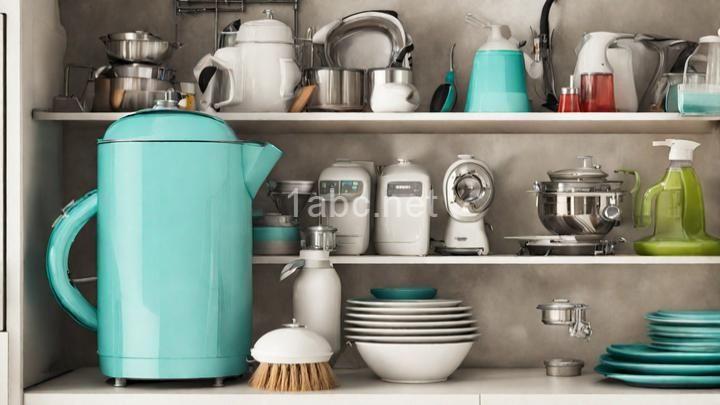Unconventional Uses for Common Household Items in Cleaning

Introduction:
- Hook: Discover the hidden cleaning superpowers of everyday items!
- Briefly explain the importance of maintaining a clean home.
- Introduce the concept of using common household items for unconventional cleaning purposes.
A clean home is not only visually appealing but also plays a crucial role in promoting a healthy and comfortable living environment. While there are countless cleaning products available on the market, many of them contain harsh chemicals that can be harmful to both our health and the environment. However, fear not! There is a world of unconventional cleaning solutions right at your fingertips. In this blog post, we will explore the incredible cleaning abilities of common household items that you probably already have in your kitchen, bathroom, and laundry room. Get ready to unleash the power of vinegar, baking soda, toothpaste, lemon juice, aluminum foil, and coffee grounds!
Section 1: Kitchen Staples
-
Subheading: Vinegar - The Wonder Liquid
Vinegar, with its acidic nature, proves to be a versatile and eco-friendly cleaner that is mild yet highly effective. Say goodbye to expensive cleaning products and embrace the power of vinegar to tackle various cleaning tasks. Need to remove stubborn stains from your countertops? Simply dilute vinegar with water and wipe the stains away. Vinegar also works wonders as a disinfectant, making it an excellent choice for cleaning cutting boards or other food preparation surfaces. Additionally, its deodorizing properties make it ideal for eliminating unpleasant odors from your kitchen. Did you know that vinegar can even be used to revive wilted vegetables? It's true! So next time you're faced with a cleaning challenge, reach for that bottle of vinegar and let its multipurpose magic work its wonders. -
Subheading: Baking Soda - The Magic Powder
If vinegar is the wonder liquid, then baking soda is the magic powder. This humble ingredient, commonly used in baking, possesses remarkable cleaning properties. Baking soda is a gentle yet effective abrasive, making it perfect for scrubbing away tough stains on various surfaces. It can be used to clean and deodorize everything from your kitchen sink to your carpet. Mix baking soda with water to create a paste and apply it to stains or odorous areas. Let it sit for a while, then scrub away the grime. Baking soda is also great for freshening up your refrigerator. Simply place an open box of it in the fridge to absorb unwanted odors. Don't forget to replace it every few months to ensure optimal freshness!
Section 2: Bathroom Heroes
-
Subheading: Toothpaste - More Than Just for Teeth
Toothpaste is not just for maintaining your pearly whites; it can also be a powerful ally in your bathroom cleaning routine. Its mild abrasiveness makes it ideal for tackling stains on bathroom fixtures. Apply a small amount of toothpaste to a damp cloth and gently buff away stains on faucets, showerheads, or even jewelry. Toothpaste can also work wonders in removing soap scum from your shower tiles. Apply a generous amount of toothpaste, let it sit for a few minutes, then scrub away the grime. When it comes to toothpaste, the minty freshness isn't just limited to your breath! -
Subheading: Lemon Juice - Nature's Bleach
Lemon juice, with its natural bleaching properties, can be a game-changer in your bathroom cleaning routine. Say goodbye to stubborn soap scum and hello to sparkling surfaces. Lemon juice can effectively remove soap scum from shower doors, bathtubs, and tiles. Its acidic properties break down the scum, leaving your bathroom spotless and fresh. Additionally, lemon juice can brighten up dull fixtures, such as faucets and drains. Simply squeeze some lemon juice onto a cloth and wipe away the stains. Don't let those leftover lemon peels go to waste either! Toss them down the garbage disposal to freshen up your sink and eliminate any unpleasant odors.
Section 3: Laundry Room Wonders
-
Subheading: Aluminum Foil - Your Laundry Assistant
Did you know that aluminum foil can be more than just a tool for wrapping leftovers? It can also be your laundry room assistant! Tired of dealing with static cling on your clothes? Place a crumpled ball of aluminum foil in the dryer along with your laundry. The foil will help to reduce static and keep your clothes looking their best. Additionally, if your scissors have lost their sharpness, simply fold a piece of aluminum foil a few times and make several cuts through it. This will help sharpen the blades, making your scissors as good as new. And if you have rusty clothespins, don't toss them out just yet! Rub them with a piece of aluminum foil to remove the rust and restore their functionality. -
Subheading: Coffee Grounds - For Freshness Beyond Coffee
Coffee grounds, beloved for their ability to brew a delicious cup of joe, have a surprising second life in the laundry room. If you're dealing with stubborn odors on your clothes, coffee grounds can come to the rescue. Simply place some used coffee grounds in a breathable bag or sock and toss it in with your laundry. The coffee grounds will help absorb and neutralize unpleasant odors, leaving your clothes smelling fresh. Coffee grounds can also act as a natural fabric softener. Add a small amount to your wash cycle to help soften your clothes without the need for chemical-laden alternatives. Just remember to clean out your washing machine filter regularly to prevent any coffee grounds from clogging the system.
Conclusion:
In this blog post, we have explored the unconventional cleaning uses of common household items. From vinegar and baking soda in the kitchen to toothpaste and lemon juice in the bathroom, and even aluminum foil and coffee grounds in the laundry room, these everyday items have proven to be powerful allies in maintaining a clean and fresh home. By embracing these alternatives, not only are you reducing your reliance on harsh chemicals, but you're also being kinder to the environment and your wallet. So next time you're faced with a cleaning challenge, think outside the box and give these unconventional cleaning hacks a try. Your home will thank you, and so will the environment!
FREQUENTLY ASKED QUESTIONS
What is Unconventional Uses for Common Household Items in Cleaning?
Unconventional Uses for Common Household Items in CleaningWhen it comes to cleaning, sometimes the simplest solutions can be found right in our own homes. Here are some unconventional uses for common household items that can help you tackle your cleaning tasks:
-
Baking Soda: This versatile ingredient is not just for baking. It can work wonders as a natural cleaner. Use it to remove stains from countertops, deodorize your refrigerator, or even freshen up your carpets. Sprinkle some baking soda on the surface you want to clean, scrub gently, and then rinse away.
-
White Vinegar: This pantry staple is a powerful cleaning agent. Mix equal parts of white vinegar and water in a spray bottle to create a DIY all-purpose cleaner. It is great for removing soap scum, cleaning windows, and sanitizing cutting boards. The vinegar smell may be strong at first, but it will dissipate quickly.
-
Lemon: Not only does lemon add a refreshing flavor to your dishes, but it can also be used as a cleaning agent. Cut a lemon in half and rub it on faucets or stainless steel surfaces to remove stains and bring back their shine. You can also add lemon peels to your garbage disposal to eliminate odors.
-
Toothpaste: Believe it or not, toothpaste can be a handy cleaning tool. Use a non-gel toothpaste to remove scuffs from shoes, polish silverware, or even clean your bathroom sink. Apply a small amount of toothpaste to a cloth or sponge, scrub the surface, and then rinse thoroughly.
-
Coffee Grounds: Instead of tossing used coffee grounds in the trash, use them to absorb odors in your refrigerator or freezer. Simply place a small bowl of coffee grounds in the appliance and let them work their magic. They will help neutralize any unpleasant smells.
Remember, these unconventional cleaning methods may not work for every situation, but they are worth a try. Always test them on a small, inconspicuous area first to ensure they won't cause any damage. Happy cleaning!
I hope you find these tips helpful in your cleaning endeavors. If you have any further questions or need more cleaning advice, feel free to ask!
How can I use common household items for cleaning?
Using common household items for cleaning can be a cost-effective and eco-friendly way to maintain a clean and tidy home. Here are a few tips on how to utilize these items effectively:
-
Vinegar: Vinegar is one of the most versatile cleaning agents. Mix equal parts vinegar and water to create a solution that can be used to clean windows, mirrors, countertops, and even remove stubborn stains. It's also great for deodorizing and can be used to freshen up your dishwasher or garbage disposal.
-
Baking Soda: Baking soda is a powerhouse when it comes to cleaning. It can be used as a gentle abrasive to scrub surfaces, such as sinks, tubs, and stovetops. Additionally, it can help eliminate odors from carpets, upholstery, and even your refrigerator. Simply sprinkle some baking soda, let it sit for a while, and then vacuum or wipe it away.
-
Lemon: Lemons are not only great for adding flavor to dishes, but they also make excellent natural cleaners. Cut a lemon in half and use it to clean and deodorize cutting boards, remove stains from countertops, and even polish metal fixtures and appliances. The acidic properties of lemons help to break down grease and grime effectively.
-
Salt: Salt is an abrasive agent that can assist in removing tough stains or grime. Mix salt with a little water to create a paste that can be used to scrub away stubborn stains on pots and pans. It can also be used to clean your coffee maker by running a mixture of salt and water through it.
-
Toothpaste: Toothpaste is not just for your teeth! It can be used to clean silverware, remove scuffs from shoes, and even polish jewelry. Simply apply a small amount of toothpaste to a cloth or toothbrush and gently scrub the item you want to clean.
Remember, when using these household items for cleaning, always test them on a small, inconspicuous area first to ensure they won't cause any damage. Additionally, be mindful of any allergies or sensitivities you may have to certain cleaning agents. Happy cleaning!
Are these unconventional cleaning methods safe?
Yes, these unconventional cleaning methods can be safe if used correctly and with caution. However, it is important to note that not all unconventional cleaning methods are equally effective or safe for every situation. It's always a good idea to research and understand the potential risks and benefits of any cleaning method before using it.Some unconventional cleaning methods may involve the use of natural ingredients, such as vinegar or baking soda, which are generally safe for cleaning purposes. However, it's important to follow proper dilution ratios and avoid mixing certain ingredients together, as this can create harmful chemical reactions.
Other unconventional methods may involve the use of household items like toothpaste or dryer sheets for cleaning. While these methods may seem harmless, it's important to consider the potential effects on different surfaces or materials. For example, toothpaste may be abrasive and can damage delicate surfaces, while dryer sheets may leave behind residue.
Ultimately, it's always a good idea to exercise caution and common sense when using any cleaning method, unconventional or not. If you have any doubts or concerns, it's best to consult professional advice or stick to traditional cleaning methods that have been proven to be safe and effective.
Can I use these unconventional cleaning methods on all surfaces?
It depends on the specific unconventional cleaning methods you are referring to and the surfaces you want to clean. Some unconventional cleaning methods may be suitable for certain surfaces but not for others. It's important to consider the material and finish of the surface before attempting any unconventional cleaning methods. For example, using abrasive materials or harsh chemicals on delicate surfaces like glass or fine wood can cause damage. If you have a specific surface in mind, I can provide you with more tailored advice on whether or not certain unconventional cleaning methods would be appropriate.




